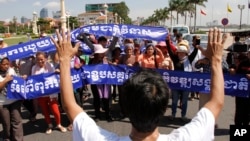Khek Chan Rasmey was warned by her husband many times to stop her activism. She had been participating in the campaigns for housing rights in the wake of mass evictions in her neighborhood of Boeung Kak lake.
She had been particularly active in 2012, taking part in demonstrations calling for the release of 13 jailed activists, when she was hit with a stream of water from a fire truck, causing complications with her pregnancy and a miscarriage.
“He was worried about my health,” Khek Chan Rasmey said in a recent interview. “When I was sprayed with water, I lost my baby.”
She was told what many women activists have reported being told to stop the protests or get divorced. And, like many, she kept protesting.
“Advocacy has led to big losses for me,” she said. “It has led to a family breakdown.”
Khek Chan Rasmey and many women like her have been forced to make a difficult choice—to join a growing movement of housing rights activism, or to remain home. If they chose activism, they face the prospect of beatings by the authorities, arrest and even prison. If not, they fear they will lose even more: their homes, their rights, and a secure future for their families.
Countless demonstrations in recent years have been filled with women. They attend rallies and protests often, while their husbands are out earning money to keep their families afloat. That leaves them little time to take care of the home or to cook, leading to problems with their marriages and family life. And then there are the effects of protesting, as well.
“We are emotionally affected, since whenever we campaign, often there’s violence, so that makes us short tempered,” Khek Chan Rasmey said.
But these are the costs she must bear to secure the future of the next generation, she said. “If I don’t protest now, in the future, my children will face even more severe injustices, because I did not dare to talk, to stand up for what is ours and for the truth.”
Ou Virak, chairman of the board at the Cambodian Center for Human Rights, said women activists should be considered role models and heroes for their courage. “What matters is whether we give them a chance or not,” he said.
About half a million people have been affected by land disputes since 2000, the rights group Licadho says. One of the largest was Boeung Kak lake. A 2007 deal between the city and a developer led to the forced evictions of thousands of people and the filling of a major lake in the north of the city. Some families took money, while others took a relocation deal that many said later was inadequate. And still others protested—up to 80 percent of them women. Thirteen women were arrested in May 2012, serving a month in jail before they were released.
Besides harassment from authorities, women face difficulties at home, including, for some, domestic violence. “They are active with their community work, and when they come home, they fight with their spouses,” said Bov Sorphea, one of the community leaders for Boeung Kak.
Bov Sorphea said that despite the risks at home, many women remain committed. “If I do not protest for the land in Boeung Kak, we would have lost our shelter,” she said. “Would we then be happy in the family?”
Licadho says that women who are the most active campaigners are some with the more troubles at home—sometimes leading to divorce or abuse.
“The fact that some men cannot accept their wives’ new roles and resort to violence is particularly troubling,” Licadho Director Naly Pilorge said.
For Khek Chan Rasmey, the choice was clear. She told her husband she would keep campaigning, despite his concerns. It was then that he got angry with her, beating her across the back with a chair before leaving her. He has not come back.
“What we’ve done, putting family happiness aside for the time being, is like a wave in a storm,” she said. “If I can deal with it for the moment, then I can get happiness for my children for the rest of their lives. Once we finish this, I can be a good wife again.”




